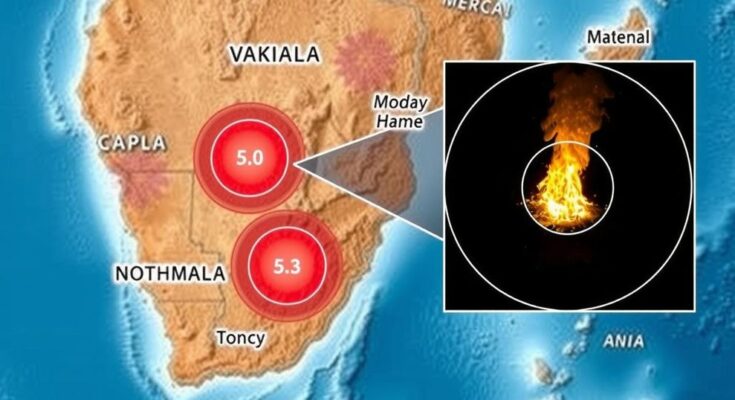A magnitude 5.3 earthquake struck South Africa’s Northern Cape on December 22, 2024, affecting residents as far as Cape Town. Centered approximately 101 km west of Brandvlei, it caused widespread alarm and over 200 reports of tremors. While initial assessments revealed no significant damage, experts emphasize the importance of preparedness for future seismic events in the region.
On December 22, 2024, South Africa’s Northern Cape experienced a notable 5.3 magnitude earthquake at 2:51 AM local time. The U.S. Geological Survey confirmed that the quake’s epicenter was approximately 101 kilometers west of Brandvlei, occurring at a depth of 10 kilometers. Tremors were felt by residents far beyond the epicenter, even in Cape Town, approximately 400 kilometers away, where over 200 individuals reported their experiences. Local farmers detailed their encounters, expressing fear and confusion as their homes shook violently.
Drienie Visser recounted, “Our whole house shook and I thought it would fall apart. That was the worst earthquake we’ve ever had,” illustrating the intense experience she shared with her husband. Lettie Malan echoed the sentiment, emphasizing the quake’s unprecedented nature. Following the initial tremor, the South African Council for Geoscience (CGS) detected ten aftershocks, the largest measuring 2.9 in magnitude.
Professor Raymond Durrheim, an expert from the University of the Witwatersrand, remarked on the historical seismic activity in the region, noting, “This region is known for swarms and clusters of seismic events,” underscoring the area’s vulnerability to such occurrences. Although there were no immediate reports of injuries or substantial damage, CGS spokesperson Mahlatse Mononela characterized the event as “unusual”, citing the Northern Cape’s prior relative seismic calm.
As local communities absorbed the shock, concerns emerged regarding the potential impact on water supply systems and boreholes, essential for agriculture. Fortunately, initial assessments indicated the structural integrity of infrastructure remained intact. The community’s sentiments reflected broader anxiety as they speculated about the relationship between seismic activity and the anticipated rainfall following a prolonged drought.
Looking ahead, the CGS committed to ongoing monitoring of the region for further aftershocks, with Mononela acknowledging the uncertainty surrounding the long-term geological outcomes. The 5.3 magnitude earthquake serves as a critical reminder of the potential for seismic activity in South Africa. Experts advocate for enhanced public awareness and preparedness concerning natural disasters, acknowledging that while the recent quake may appear minor on a global scale, it significantly impacted the local population.
Earthquakes in South Africa are relatively rare, particularly in the Northern Cape, which has historically experienced little seismic activity. The recent earthquake, registering at a magnitude of 5.3, has heightened awareness of the region’s vulnerability to such natural disasters. The aftermath has prompted discussions about community preparedness and the geological implications of seismic events, as experts aim to understand better the factors contributing to such occurrences in areas not typically associated with high seismic risk.
The magnitude 5.3 earthquake that struck the Northern Cape serves as a stark reminder of the region’s latent geological risks. While there were no significant injuries or damage reported, the event has elicited widespread concern among residents and experts alike regarding potential aftershocks and the overall preparedness for future seismic activities. Continuing monitoring and community education on disaster readiness will be essential in mitigating the impacts of similar events going forward.
Original Source: evrimagaci.org



